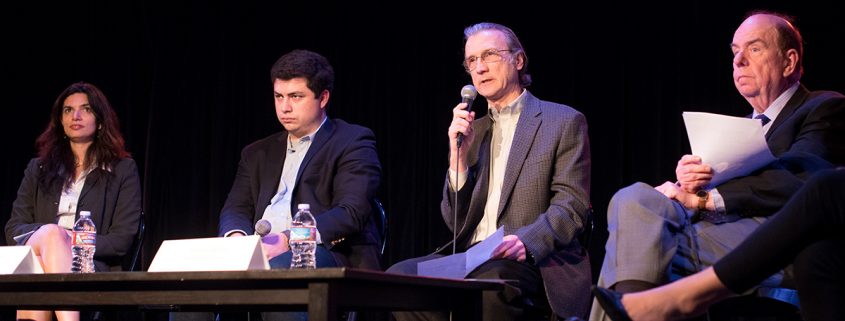Event discusses US global role in Trump era
The first 100 days of Donald Trump’s administration will span most of the rest of the semester. On Tuesday, students and professors gathered to discuss what this would mean for American foreign policy. The event, entitled “America’s Role in the World in the Era of Trump,” is the first of the series hosted by the Jesse M. Unruh Institute of Politics.
The panel was moderated by Unruh Institute Director and featured Jefferey Sellers, an associate professor of political science and public policy; Nina Rathburn, an associate professor of international relations; and Luke Phillips, a senior studying international relations.
Panelists were asked everything from the situation in the Middle East to Brexit and the rise of “alt-right” movements in Europe and China. They also discussed possible foreign policy avenues that Trump might take, including the fight against ISIS, the United States’ relationship with Russia and the recent withdrawal from the Trans-Pacific Partnership.
Unlike his predecessors, the President has no clear-cut foreign policy agenda, so the panelists relied heavily on conjecture based on campaign promises and Trump’s Twitter account. They also used the inaugural speech as a possible indication of his policies.
“One thing that is clear about the Trump administration is that they’re going to gear policy towards the U.S. and the electorate,” Sellers said, referencing Trump’s “America First” promise in his inaugural speech last Friday.
Rathbone, however, disagreed. She said that an “American First” foreign policy is almost impossible to achieve based on previous entanglements abroad and the global society that we live in today. She explained that there is no way to know exactly what Trump is thinking or how he will structure his administration’s foreign policy.
“I would recommend to ignore a lot of the Twitter feed of the Trump administration,” Rathbone said. “I don’t think even he means to have a lasting impact.”
Rathbone said that though Twitter was the main avenue of communication that Trump used to communicate with his supporters during the campaign, that may not be the case now that he is in the White House.
Phillips agreed and pointed out the prominence of foreign policy in President Trump’s messaging.
“Foreign policy seems to be much of a branding effort for the Trump administration, dating back to the campaign,” Phillips said.
The panel from the Unruh Institute was the first since the election of Trump. Unruh will continue to hold evening programming on Tuesday nights for students discussing the current state of politics.

